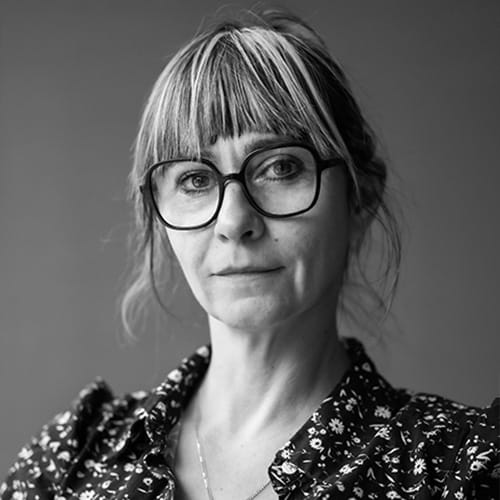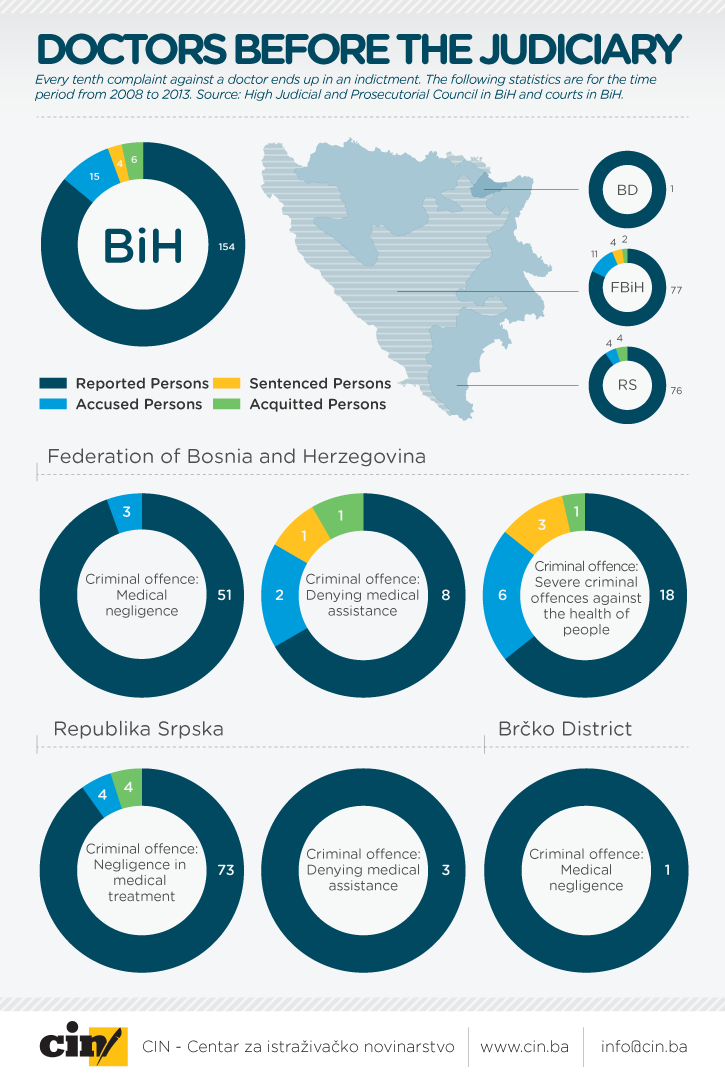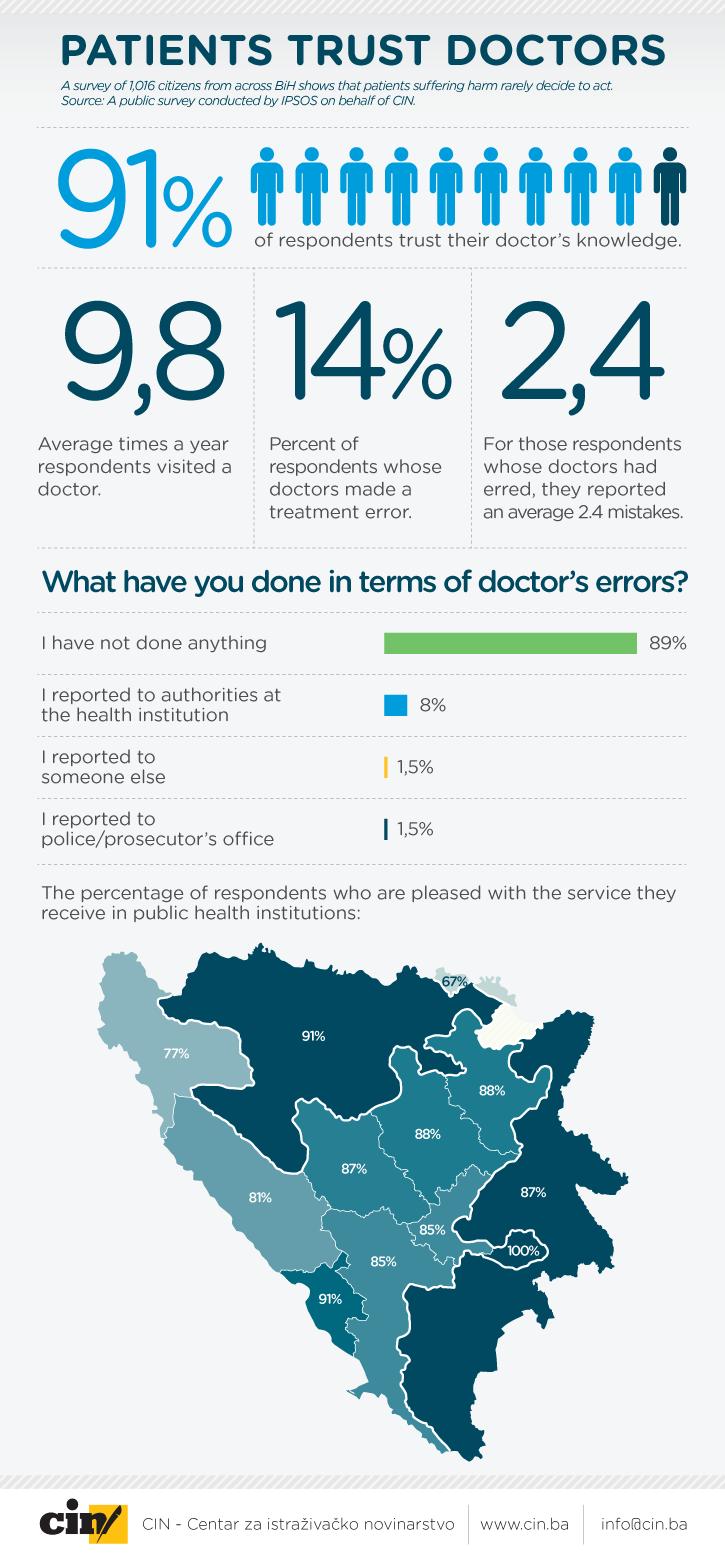Sanja Klokić gave birth to a stillborn because of the doctor she turned to for help. Instead of keeping her in the hospital as instruments showed that her baby’s heart was racing, he sent her home. The baby suffocated. After court proceedings, the doctor continued to work as head of the Gynecology Ward at the General Hospital in Gračanica, as if nothing had happened.
According to records collected by the Center for Investigative Reporting in Sarajevo (CIN), 154 persons were reported over the past five years for severe criminal offenses against human health, medical negligence and denying medical assistance.
This led to 15 indictments, which ended in six acquittals and four sentenced doctors. Only one doctor was sent to prison.
Even though their errors led to patients’ deaths and to disabilities, none of the doctors lost their medical licenses. According to CIN findings, two persons still work at the same jobs in which they committed criminal offenses, but their new patients are unaware of that.
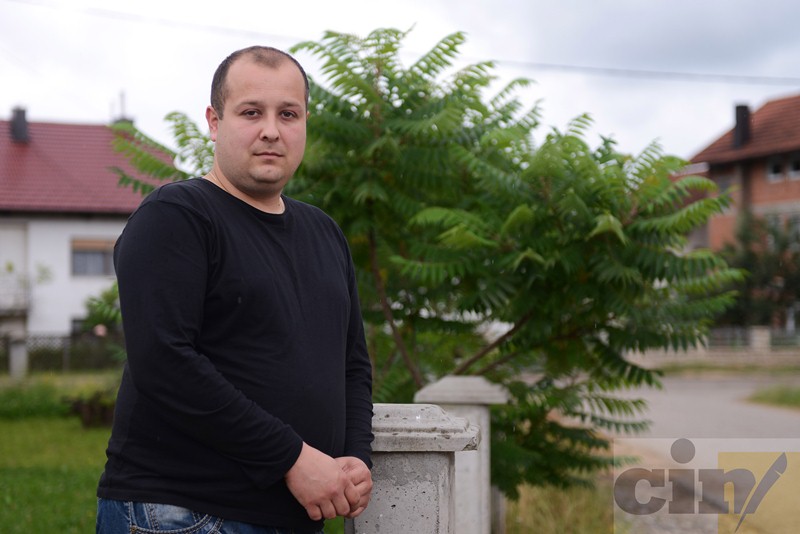
At the Right Time with the Wrong Man
In mid-July 2008, Sanja Klokić from Doboj East was expecting a baby girl. Her pregnancy was followed by doctors in the nearby clinic, but since it was a weekend, she went with her husband for a check up at the General Hospital Dr. Mustafa Beganović in Gračanica, some 10 kilometers away. Dr. Adem Aljić did a check-up and recorded the fetal heartbeat. Though the baby showed an accelerated heartbeat, he sent the patient home.
“This is how we parted our ways. We took the results, left to buy a bed for the baby, and then went home,” recalled Faruk Klokić in a CIN interview. His wife was unable to speak about it.
Klokić said that his wife could not sleep that night from pain. The baby suffocated during the night. The following day they returned to the Gračanica hospital where it was established the fetus was dead. The Klokićs were sent to the Clinical Center in Tuzla. The doctor on call told them that they should’ve come a day earlier and that they should keep the recorded fetal heartbeat because they would need it.
“We were at the right time at the right place but with the wrong man,” said Klokić.
Since then, he had been collecting documents for months to file a complaint with the prosecutor’s office. Two years later, the Tuzla Cantonal Prosecutor’s Office filed an indictment against Dr. Aljić. The court found that the baby would have lived had Aljić not had sent the mother home. The trial also revealed that Sanja Klokić’s life was threatened by a dead fetus left inside her.
During the trial, Aljić asked one of the expert witnesses whether the Clinic was capable of accepting all patients whose fetuses have an accelerated heartbeat. According to the verdict, the judge took this as an indicator that the doctor cared about irrelevant things, meaning the work organization at the clinic, and that he took lightly the state of the patient, thinking it would not get more complicated.
The criminal offense he was convicted of carries a prison sentence of up to three years. However, the February 2013 verdict handed down by the Cantonal Court in Tuzla sentenced the doctor to six months probation. He will not serve any time unless he commits another crime before February 2015. Mitigating circumstances in his case were his clean criminal record and the fact that doctors at the Health Clinic in Doboj East were in charge of the patient.
After the verdict, Aljić continued working as the head of the Gyneacological Ward at the General Hospital in Gračanica.
Faruk Klokić said that he would not let Aljić even do a check-up of his dog. “I was interested in one thing alone – that he be declared guilty! That he knows that he’s not God-given, that he’s not untouchable, that there’ll always be someone smart who has, eventually, enough money to follow through (to beat him in court),” said Klokić.
He is aware that he did not gain any personal benefits from the five-year-long court process. “I lost what I had. It will do me no good, but I know well what label he’s got to get.”
But the verdict left no mark on the doctor’s career. In addition to his post in Gračanica Hospital, he also got a new engagement in the Public Health Clinic of Doboj East. He visits twice a week. Women in this municipality have no other gynecologist.
Three of his patients from Klokotnica in Doboj East municipality told CIN reporters that they had no idea Aljić was on probation. They did not know that because of him one baby was dead. Neither the doctor nor the clinic’s staff told them anything about it.
Clinic Director Dr. Aladin Šabić said that the hiring in this institution is all done in accordance with the law. “I don’t feel that I owe an explanation to anyone,” he said to reporters who asked how do they check if an employee has been convicted of a crime and about the institution’s policy toward hiring people with criminal records.
Šabić said that the verdict did not mean that they had to break off the labor contract and that the doctor has the right to work in his and other institutions.
“Neither I, nor you or anyone else can approach this with simply ‘I don’t like it,’” said Šabić.
Aljić refused to talk with reporters. Management at Gračanica Hospital said that after the verdict, they “took steps in line with the legal regulations” without explaining what those were.
At the time this criminal offense was committed, the Criminal Code of Federation of BiH did not allow judges to ban continued employment for sentenced doctors. Only in 2010 was the law amended to allow that.
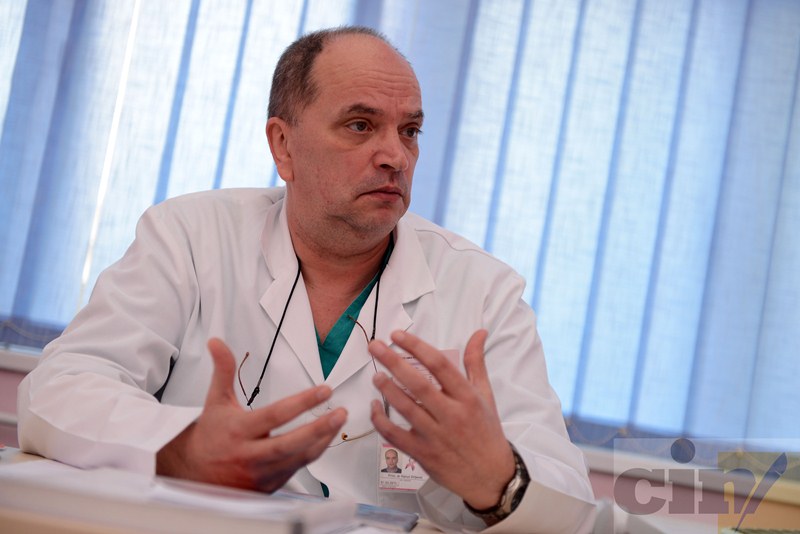
Medical Associations are Unaware of Verdicts
Even though the courts could not forbid someone to work, medical associations could have done that, according to the health protection laws of both Bosnian entities. The associations give out medical licenses, without which the doctors could not work in the medical profession. They can temporary or permanently forbid doctors sentenced for a criminal offense to practice their profession.
CIN found that this rarely happens. Over the past five years only two of 12 medical associations recorded cases of licenses being withdrawn from sentenced doctors.
Officials from the Sarajevo Canton Medical Association say that they took a license from gynecologist Zijad Lagumdžija who was sentenced to four months in prison in 2008 for corruption, and from Ognjen Šimić who was sentenced for the same criminal offense to two and half years in 2011. Both have died in the meanwhile.
The Republika Srpska (RS) Medical Association wrote CIN that it temporarily withdrew a license from one doctor, but refused to name that doctor or the criminal offense he committed. Records from county and basic courts in RS show no sentencing verdicts in the area that the association covers for medical negligence or denying medical assistance in the past five years.
Medical associations’ representatives from the areas in which there have been verdicts, said that they did not know about them. The courts are not obliged to inform them, and they did not get that information independently.
Harun Drljević, president of the FBiH Medical Association, said that every association would withdraw the license, provided it is officially informed of a guilty verdict.
“And, by the same token, do not expect a president of an association to do it if he does not receive an official document. Firstly, because it is not serious, and secondly, because it is a colleague of his,“ he said.
Aljić is a member of Tuzla Canton Medical Association. That group found out about the verdict against him from CIN reporters. After CIN’s visit, Faruk Klokić reported Aljić to the Medical Association. Lejla Šehović, secretary general of the association, said that the case is being reviewed for possible license withdrawal.
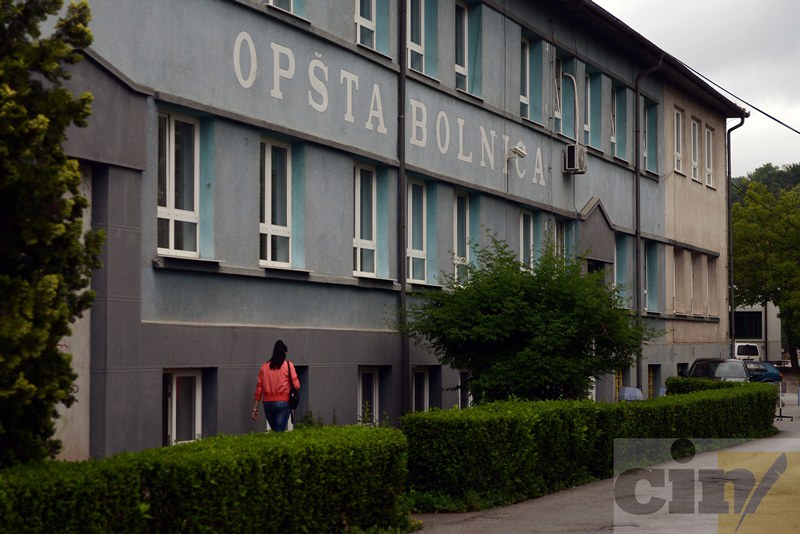
Cut Nerve
The Una Sana Canton Medical Association also never took away a license, though doctors Anis Alagić and Hamdija Eškić were sentenced in the past five years. Association officials said they didn’t even hear about that.
Bihać resident Zijad Zanačić was left permanently disabled by Alagić. In October 2005 he came to the Cantonal hospital in Bihać for removal of fat tissue near his knee. Alagić, an intern at the Surgery Ward, was not allowed to do surgeries independently. He did it nevertheless and during the operation cut into a nerve in the patient’s leg.
Zanačić told CIN reporters that he saw that the doctor was young, but he did not know that he was an intern, because he did not tell him. He said no one warned about the possible complications of the operation. He reported having felt pain when the doctor cut his nerve, but that he did not know it happened at that moment.
Instead of coming home healthy, Zanačić left the hospital disabled. “I could not raise my foot and I cannot raise it now either,” he said.
The Bihać Prosecutor’s Office filed an indictment in April 2008, and the case closed four years later. Alagić pleaded guilty and received a six-month probation. He did not lose his license and he now works as a plastic surgeon in the Cantonal Hospital Dr. Irfan Ljubijankić in Bihać. Hospital management knows that Alagić was sentenced, but they said that he is still working because the court did not forbid him to.
Dr. Fehim Kadić, president of USK Medical Association, said that he never heard about Alagić’s sentence, not even through the word of mouth. He said that all the regulations would have been carried out had they been notified.
“We are not informed by anyone that there’s a case against a doctor, so we have no access…I hold a grudge that I’m not informed while something is going on in my beat,” said Kadić. He added that the court does not have an obligation to inform them, but it would be “only expected” that the hospital director has informed them.
The hospital management said that they did not know if someone from the hospital has informed the association about the case.
Alagić did not want to comment because, he said, it happened a long time ago.
Trust in Doctors
Kadić said that he did not hear about Hamdija Eškić either. The Cantonal Court in Bihać sentenced this doctor in May 2011 to one-year probation.
Eškić was sentenced because a 10-month old girl, Adisa Šabić from Velika Kladuša, died after he treated her. In January 2002, Eškić was the doctor-on-call at the Velika Kladuša Public Health Clinic. During his shift, Sebiha Atajić brought in her toddler who had been vomiting and suffering from diarrhea and a high temperature for several days.
The court established that Eškić did no lab check-ups but prescribed drugs insufficient to cure the baby. The girl dehydrated and died the following morning. Eškić defended himself at the court by saying that the mother did not ask for her baby to be put on drip feed.
“There were no indications that this was necessary, because the baby was cheerful,” said Eškić during the trial. He said that he could not request lab analysis because the labs do not work during the night, but that such analysis was not necessary anyway taking into account the results of his examination.
“I did not give instructions for such analysis of the child. I did not think it was necessary. It was not my first case. Those drugs that I prescribed are prescribed in pediatric treatment,” said Eškić, a physiotherapist, working temporarily at the time as a general practitioner.
The officials from the Velika Kladuša Public Health Clinic said that Eškić was employed on a service contract. His contract expired in July 2002. According to CIN findings, Eškić who has been retired for the past 10 years, now lives in Sarajevo. CIN reporters have on two occasions visited a house where he lives but did not find him in. His wife refused to tell the reporters where the doctor was.
Sarajevo anesthesiologist Amila Cvijetić-Koldžo is the only doctor sentenced to a prison sentence. While administering an epidural anesthesia during labor she pierced Svjetlana Zukić’s spinal cord membrane in 2007. She did not report her error and continued to treat the patient at her home which in the end led to the woman’s death. The doctor was sentenced to three years in prison.
CIN’s investigation found that Dr. Cvijetić-Koldžo worked at the Clinical Center of the Sarajevo University for 14 months after the verdict. The doctor was sent to serve time in Tuzla on July 6 of this year. Soon after, her contract was terminated.
In a March 2014 survey that Public Research Agency IPSOS did on behalf of CIN, 14 percent of respondents thought that a doctor had erred during treatment they received. Still, nine out of 10 did nothing to follow-up on the error. More than 90 percent of respondents said that they had trust in their doctor’s knowledge.
The survey included a sample of 1,000 citizens from across BiH who have health insurance and who visited a doctor at least once during the last year.


